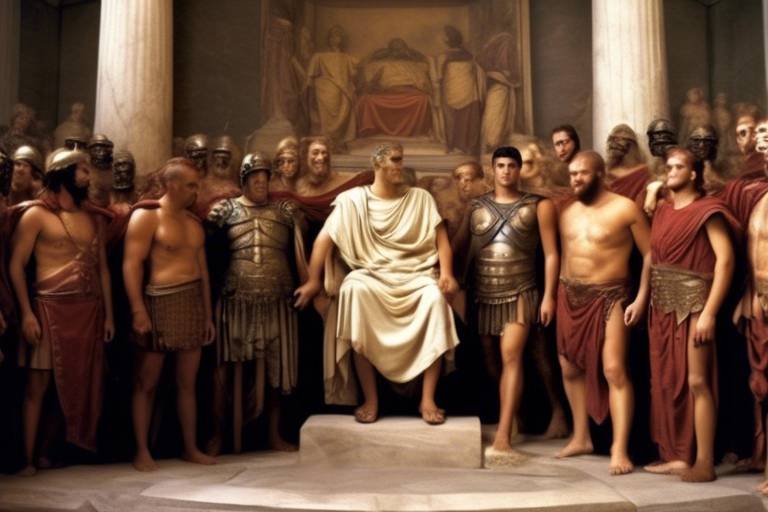The Influence of Ancient Greece on Western Philosophy
Ancient Greece holds a revered position in the annals of history for its profound influence on Western philosophy. The intellectual legacy of ancient Greek thinkers such as Socrates, Plato, and Aristotle reverberates through the corridors of time, shaping the very foundation of philosophical thought in the Western world. Their groundbreaking ideas and philosophical inquiries laid the groundwork for the development and evolution of Western philosophy, setting the stage for centuries of intellectual discourse and contemplation.

Foundational Philosophical Ideas
Ancient Greek philosophers, including the iconic figures Socrates, Plato, and Aristotle, introduced foundational philosophical ideas that have profoundly influenced Western philosophical traditions. Socrates, known for his Socratic method of questioning, emphasized self-knowledge and the importance of critical thinking in the pursuit of truth. Plato, a student of Socrates, delved into the realm of ideal forms and the concept of the soul, laying the groundwork for metaphysical inquiries. Aristotle, in turn, focused on empirical observation and logic, establishing the foundations of scientific reasoning and categorization.
These philosophical giants not only shaped the way we think about the world but also established the framework for ethical inquiry. Discussions on virtue, moral integrity, justice, and the pursuit of the good life were central to ancient Greek philosophy, setting the stage for ongoing debates on ethics in Western thought. The concept of virtue as a means to achieve eudaimonia, or human flourishing, remains a cornerstone of ethical theory influenced by ancient Greek philosophy.
Moreover, ancient Greek philosophers explored metaphysical and epistemological questions that continue to resonate in contemporary philosophical discourse. Their inquiries into the nature of reality, knowledge, existence, and truth laid the foundation for metaphysics and epistemology as distinct branches of philosophy. The enduring legacy of their investigations can be seen in modern debates on the nature of reality, the limits of human knowledge, and the search for ultimate truths.
By examining the foundational philosophical ideas of ancient Greece, we gain insight into the origins of Western philosophical traditions and the enduring influence of these ancient thinkers on our intellectual heritage. Their contributions have shaped not only how we understand the world but also how we grapple with ethical dilemmas, metaphysical mysteries, and the pursuit of a meaningful life.

Ethics and Virtue
When delving into the realm of ancient Greek philosophy, one cannot overlook the profound discussions on ethics and virtue that have left an indelible mark on Western philosophical thought. The ancient Greek philosophers, including the revered figures of Socrates, Plato, and Aristotle, dedicated significant attention to exploring the concepts of moral integrity, justice, and the pursuit of the good life.
Central to their ethical theories was the notion of living a virtuous life, guided by principles that aimed at achieving personal excellence and moral goodness. Socrates, known for his relentless questioning and pursuit of truth, emphasized the importance of self-examination and moral integrity in the quest for wisdom and ethical living.
Plato, a student of Socrates, further expanded on the ethical discourse by proposing the theory of the Forms, positing that true virtue and goodness are derived from the realm of abstract ideals rather than material reality. His allegory of the cave symbolizes the journey towards enlightenment and the discovery of ultimate truths that govern ethical behavior.
Aristotle, often regarded as one of the greatest philosophers in history, contributed significantly to the understanding of ethics by introducing the concept of eudaimonia, or the pursuit of happiness through virtuous actions. His Nicomachean Ethics remains a cornerstone of ethical philosophy, exploring the connection between virtue, moral character, and human flourishing.
Through their discussions on ethics and virtue, ancient Greek philosophers laid the groundwork for Western moral philosophy, shaping the ethical frameworks and principles that continue to inform contemporary debates on morality, justice, and the essence of the good life.

Metaphysics and Epistemology
Metaphysics and epistemology are two foundational branches of philosophy that delve into the nature of reality, knowledge, and truth. In ancient Greece, philosophers such as Parmenides and Heraclitus grappled with metaphysical questions concerning the nature of existence and change. Parmenides argued for the unity and immutability of being, positing that change and multiplicity are mere illusions. On the other hand, Heraclitus famously proclaimed that "you cannot step into the same river twice," emphasizing the flux and constant change inherent in the world.
Epistemology, on the other hand, focuses on the nature of knowledge and how we come to know what we claim to know. Plato's theory of forms, a central tenet of his philosophy, posited that true knowledge is derived from a realm of perfect and immutable forms, distinct from the imperfect physical world we perceive. This philosophical inquiry laid the groundwork for centuries of debate on the nature of knowledge and the relationship between perception and reality.
One of the most influential figures in ancient Greek metaphysics and epistemology was Aristotle, who sought to reconcile the theories of his predecessors while developing his own systematic approach to philosophical inquiry. Aristotle's concept of substance and his theory of causality profoundly influenced Western thought, shaping not only metaphysical and epistemological debates but also scientific inquiry and logical reasoning.
Aristotle's emphasis on empirical observation and logical analysis as the foundations of knowledge laid the groundwork for the scientific method and the rationalist tradition in philosophy. His contributions to metaphysics, including the notions of potentiality and actuality, and his exploration of the nature of being and essence continue to inform contemporary philosophical discussions on existence and identity.

Political Philosophy
Political philosophy in ancient Greece was a vibrant and integral part of philosophical discourse, with prominent thinkers such as Plato and Aristotle delving into questions of governance, citizenship, and the role of the individual in society. Plato's "Republic" explored the ideal state and the concept of philosopher-kings, proposing a hierarchical society governed by wisdom and reason. Aristotle, on the other hand, analyzed different forms of government, advocating for a balanced constitution that combines elements of monarchy, aristocracy, and democracy to prevent tyranny and promote the common good.
These ancient Greek philosophical ideas on politics continue to resonate in Western political thought, influencing the development of democratic principles, the concept of citizenship, and the relationship between the individual and the state. The emphasis on civic participation, rule of law, and the pursuit of justice as essential components of a well-ordered society can be traced back to the foundational insights of ancient Greek political philosophy.

Aesthetics and Philosophy of Art
Exploring the ancient Greek perspectives on aesthetics and the philosophy of art unveils a rich tapestry of ideas that have profoundly influenced Western artistic traditions. The Greeks viewed beauty not merely as a superficial attribute but as a reflection of harmony, balance, and proportion in the world. This emphasis on aesthetic principles as essential components of artistry continues to resonate in contemporary artistic practices, guiding creators in their pursuit of expressing beauty and meaning through various forms of artistic expression.
The philosophy of art in ancient Greece extended beyond the mere appreciation of beauty to encompass deeper contemplations on the nature of creativity and artistic inspiration. Artists were seen as conduits of divine inspiration, channeling the muses to create works that captured the essence of human experience and emotion. This reverence for the creative process and the transformative power of art laid the groundwork for Western conceptions of artistic genius and the enduring impact of art on society and culture.
Moreover, the Greeks recognized the significance of art not only as a means of aesthetic pleasure but also as a vehicle for conveying moral and philosophical messages. Through artistic representations, they sought to explore fundamental questions about the nature of existence, the human condition, and the complexities of life. Art was perceived as a powerful medium for engaging with profound philosophical ideas, inviting viewers to contemplate universal truths and reflect on the complexities of the world around them.
Central to the Greek philosophy of art was the notion of mimesis, the imitation of nature in artistic creation. Artists were encouraged to observe the world around them and replicate its beauty and order in their works, striving to capture the essence of reality through their artistic endeavors. This emphasis on the faithful representation of nature and the human form laid the foundation for realistic artistic representations and the pursuit of artistic excellence based on the principles of harmony, proportion, and fidelity to the natural world.
Overall, the ancient Greek perspectives on aesthetics and the philosophy of art continue to resonate in contemporary artistic practices, inspiring artists to explore the boundaries of creativity, express profound truths through their works, and engage viewers in meaningful dialogues about the nature of beauty, truth, and the human experience.

Logic and Reasoning
Logic and reasoning form the cornerstone of ancient Greek philosophical thought, with philosophers like Aristotle making significant contributions to the development of rational inquiry. Aristotle, often regarded as the father of logic, delineated the principles of deductive and inductive reasoning that continue to underpin Western rational thought. Through his work on syllogisms and logical fallacies, Aristotle established a framework for sound argumentation and critical thinking that remains influential in contemporary philosophical discourse.

Continuity and Evolution
The continuity and evolution of ancient Greek philosophical ideas have been a remarkable journey through the annals of Western thought. From the foundational concepts introduced by luminaries like Socrates, Plato, and Aristotle to the intricate debates on ethics, metaphysics, and political philosophy, Greek philosophy has served as the bedrock upon which Western intellectual traditions have been built.
As the torchbearers of rational inquiry and critical thinking, ancient Greek philosophers paved the way for the development of logic and reasoning as essential tools in philosophical discourse. The enduring legacy of their contributions can be seen in the principles of deductive and inductive reasoning that underpin modern scientific inquiry and philosophical argumentation.
Moreover, the exploration of metaphysical and epistemological questions by thinkers such as Parmenides, Heraclitus, and Pythagoras laid the groundwork for ongoing discussions on reality, knowledge, and the nature of truth. Their inquiries into the fundamental nature of existence continue to shape contemporary debates in philosophy and science.
Through the Middle Ages, Renaissance, Enlightenment, and into the modern era, the ideas of ancient Greek philosophers have undergone a process of adaptation and reinterpretation, blending with new intellectual currents and cultural contexts. This continuity of thought has ensured that the spirit of Greek philosophy remains alive and relevant in the ever-evolving landscape of Western intellectual discourse.
From the ethical theories of Aristotle to the political insights of Plato, the influence of ancient Greek philosophy can be felt in diverse areas of human thought and endeavor. The evolution of these ideas over centuries is a testament to the enduring power of philosophical inquiry to transcend time and space, resonating with each generation in unique and profound ways.

Contemporary Relevance
When considering the of ancient Greek philosophical concepts and methodologies, it becomes evident that their impact transcends time and continues to shape various aspects of modern thought and society. The enduring legacy of Greek philosophy resonates in the ongoing debates surrounding ethics, politics, aesthetics, logic, and metaphysics, offering valuable insights into navigating the complexities of the present-day world.
A key area where ancient Greek philosophy remains highly relevant is in ethical dilemmas and moral decision-making. The ethical theories proposed by philosophers like Aristotle and Plato provide a framework for addressing ethical challenges and understanding the principles of moral integrity. These philosophical insights help individuals and societies grapple with complex ethical issues and strive towards a more just and virtuous existence.
Moreover, the philosophical methodologies developed by ancient Greek thinkers, such as the emphasis on critical reasoning and logical argumentation, continue to be instrumental in contemporary philosophical inquiry. The principles of deductive and inductive reasoning, as expounded by Aristotle, serve as foundational tools for analyzing and evaluating arguments, fostering rational discourse, and advancing knowledge across diverse fields.
Aesthetically, the Greek perspectives on beauty, creativity, and artistic expression offer a timeless lens through which to appreciate and interpret the world of art. The philosophy of art articulated by ancient Greek philosophers influences contemporary artistic practices, encouraging individuals to contemplate the nature of beauty, the role of creativity, and the significance of artistic endeavors in shaping cultural narratives.
Furthermore, the political philosophy of ancient Greece, with its discussions on governance, democracy, and citizenship, continues to inform contemporary debates on political systems and civic engagement. The ideas of thinkers like Plato and Aristotle regarding the role of the individual in society and the principles of good governance resonate in discussions on democracy, human rights, and social justice.
In addressing societal challenges and navigating the complexities of the modern world, the insights gleaned from ancient Greek philosophy offer a valuable intellectual foundation. By reflecting on the enduring relevance of Greek philosophical concepts, contemporary thinkers can draw inspiration from the timeless wisdom of the past to engage with pressing philosophical debates, ethical quandaries, and existential questions that shape our shared human experience.
Frequently Asked Questions
- What were some of the key philosophical ideas introduced by ancient Greek philosophers?
Ancient Greek philosophers introduced foundational ideas such as the pursuit of knowledge, the importance of ethics and virtue, the exploration of metaphysics and epistemology, discussions on political philosophy, perspectives on aesthetics and art, the development of logic and reasoning, and more.
- How did ancient Greek philosophy influence Western intellectual traditions?
Ancient Greek philosophy laid the groundwork for Western philosophical thought by shaping fundamental concepts and approaches that continue to influence modern thinking. The ideas of Greek philosophers like Socrates, Plato, and Aristotle have had a lasting impact on ethics, metaphysics, political philosophy, aesthetics, logic, and reasoning.
- What is the contemporary relevance of ancient Greek philosophical concepts?
Ancient Greek philosophical concepts remain relevant today in addressing current philosophical debates, ethical dilemmas, and societal challenges. The enduring legacy of Greek philosophy continues to inform and inspire discussions on a wide range of issues in the modern world.



















